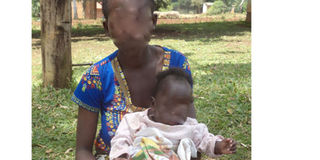Rising defilement cases worry Sembabule leaders

Leaders in Sembabule are concerned that some of the defilement offenders are relatives. PHOTO BY STEPHEN OTAGE
What you need to know:
- Many of such cases are blamed on poverty and failure by parents to send their children to school.
- According to Mr Ronald Were, the head of crime investigations in Sembabule District, the largest percentage of defilement cases are recorded in the cattle corridor areas, especially in Ntuusi Sub-county.
SEMBABULE- Ssembabule District leaders have raised a red flag about the increasing cases of defilement.
On average, 13 girls are defiled every month, a number the leaders say is worrying given that some young girls are infected with HIV/Aids.
Sixty-seven girls have been defiled in Ssembabule District in the last five months, according to police records. Child rights organisations accuse close relatives of being among the offenders.
According to Mr Jude Kiganda, the Sembabule District vice chairperson, the number of defiled girls in the district could be much higher because many cases go unreported as victims choose to suffer in silence.
In other instances, parents negotiate with offenders and the matter is settled out of court, which partly explains the increasing cases of defilement in the district.
“This trend is really worrying and there is no way we can deter offenders when parents decide to negotiate with them to kill the cases,” Mr Kiganda told Daily Monitor in an interview on May 24.
According to Mr Ronald Were, the head of crime investigations in Sembabule District, the largest percentage of defilement cases are recorded in the cattle corridor areas, especially in Ntuusi Sub-county.
“We have tried our level best to arrest the offenders and most of these cases are already in court,” Mr Were said on May 25.
“What is disturbing is that some of the victims’ parents often negotiate with the offenders in exchange for cows, which derails our efforts to fight this crime,” he said.
Children exposed
Police and civil society organisations like Kitovu Mobile and the Dreams project reveal that many children in Sembabule are exposed to defilement, child prostitution, and underage marriages.
Mr Peter Semaganda, the coordinator of Kitovu Mobile, a civil society organisation that empowers young girls who drop out of school, attributes this to various reasons such as poor cultural practices and poverty.
“We have a number of girls who were married off at a tender age and later divorced. Others are victims of defilement and sadly, in some of these cases, it is the fathers who are the offenders,” Mr Semaganda said.
Nationally, defilement is one of the most common cases recorded at police and the police annual report for 2013 indicates that defilement is the leading sex-related crime reported in the country with a total of 9,598 cases reported compared to 8,076 cases registered in 2012 and 7,690 reported in 2011.
Mr Twaha Musoke, the Sembabule District probations officer, said the district lacks enough resources to take care of victims of defilement and to sensitise communities.
“We need to carry out serious sensitisation of communities, but as a District, we lack funds to roll out such a programme” he says
Many of such cases are blamed on poverty and failure by parents to send their children to school.
Report
A recent survey entitled “Status on child protection in Rakai District” revealed that at least 306 girls were defiled in Rakai District last year.
According to the Police Crime and Road Safety report 2013, defilement was also one of the leading crimes, with 9,598 cases. The report indicated that a total of 9,589 cases were recorded in 2013 compared to 8,076 cases in 2012.




